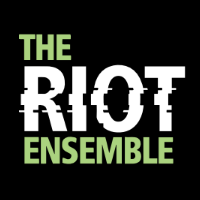A few moments with Amy Beth Kirsten
 I’m very excited about our upcoming season which reflects The Riot Ensemble’s dedication to introducing British audiences to contemporary music by composers from around the world. In our first concert of 2013, ‘The Magic Bass Flute,’ we have programmed a piece entitled Two Monologues by American composer Amy Beth Kirsten.
I’m very excited about our upcoming season which reflects The Riot Ensemble’s dedication to introducing British audiences to contemporary music by composers from around the world. In our first concert of 2013, ‘The Magic Bass Flute,’ we have programmed a piece entitled Two Monologues by American composer Amy Beth Kirsten.
Amy was previously a singer-songwriter based in Chicago and, as with all of her music, Two Monologues reflects her deep connection with ideas such as memory, voice, theatre and breath. Each movement is a monologue for a solo instrument (Pirouette on a Moon Silver for solo flute and (speak to me) for solo piano). Both are highly virtuosic, with the soloist vocalising alongside colourful, detailed and intricate music performed on their instrument. I’ve been inspired by Amy’s music from the moment I first heard it. I was particularly pleased to have the opportunity to ask her a few further questions about her music:
Hi Amy, and thank you for taking the time to answer a few questions for us! Your music is very unique in its drama and use of the human voice. I wanted to begin by asking if you have had an experience similar to Witold Lutoslawski’s: When he heard John Cage’s 2nd Piano Concerto on the radio, the encounter changed his musical thinking and ushered in a new creative period, the first result of which was his Jeux vénitiens (1960-61)?[1]
Thanks for having me. And yes, something like that did happen to me. I came to composing somewhat late, having had my first composition lesson at the age of thirty. Prior to this, I was trained as a pianist and vocalist with a specialty in vocal jazz improvisation, but spent much of my time writing and performing songs that had nothing to do with my training. When I returned to school to study composition, it was with the goal of learning to orchestrate those pop songs. As fate would have it, I had the opportunity, within the first weeks of school, to hear the International Contemporary Ensemble play a concert that included Vox Balaenae by George Crumb[2] and Eight Songs for a Mad King by Peter Maxwell Davies. I had never heard music like this before![3]
The performances were arresting and the sound worlds these two composers created…well, let’s just say it was a real awakening for me. I’ve always loved music that feels free and inevitable, that makes use of theatrical elements, and that have had a long-time fascination with timbre. All of these things were represented that night. It was music that I really identified with. So I guess you could say that this concert was the beginning for me, not to learn how to emulate those sounds, but to discover a musical path for myself that had the ring of truth.
That’s wonderful. I don’t doubt your music will have a similar effect on young musicians who hear it. With your vocal background in mind, could you tell us a bit about how you compose?
I sing, improvise, record myself, videotape myself playing improvisations at the piano and transcribe small pieces of those improvisations to discover the characteristics and possibilities of the material. Then I take what I’ve transcribed and improvise with that material and record myself. Then I transcribe some more. This process goes on for a while. Once I have an arsenal of material and its possibilities, I begin to put the pieces together into a larger framework that makes sense to me.
One thing I come back to again and again when listening to your work is how theatrical it is. Do you conceive your pieces this way? And do you think about specific dramatic (large scale structures) when writing?
I’ve had the experience recently of being asked to compose a piece that is music first and theatre second. It really seemed like a strange request because, to me, there is no difference. I can’t listen to a live performance without thinking about how the musicians bodies are moving, or without taking in their facial expressions or unintended vocalizations like breaths and grunts. As soon as you put music, movement, and attainment together, you have a kind of dance – a kind of drama.
Each piece I write has its own starting point, sometimes it’s a word or an image, sometimes it’s a musical sound that requires a very specific physical gesture (or vice versa), and sometimes it’s simply a musical motive. I have never intended to write a “theatrical” piece – I just let come out whatever wants to come out and try not to get in the way.
To answer the second part of your question, I’m not sure you can have drama without structure – and so I am very conscious of pacing and tension while I’m composing.
That’s really interesting to me because, as both a composer and conductor, I’m someone who demands a lot of control of the music. I love this idea, then, of trying ‘not to get in the way’ of the composition. You obviously, though, work very closely with specific performers when composing your work. What is it like to have pieces scheduled by performers you’ve never met?
It’s about the coolest thing ever. I feel incredibly fortunate when someone I don’t know programs a piece. Often I’ll get to hear a recording of the performance and its endlessly fascinating to hear how different performers interpret music. One of the things I most love about music is that it can be felt so incredibly differently from person to person. Two Monologues, being performed on The Magic Bass Flute concert, is a piece that has a freer quality about it, even though the entire work is carefully notated. It’s made up of two movements that are driven most especially by the individual’s connection to the theatricality of the characters the musicians are playing. The flute player is a diabolical Harlequin flutist and the pianist plays two different characters at once – Echo and Juno of the Narcissus myth. I’m really excited to hear how these extraordinary players bring these characters to life.
[1] This question mirrors the first of Bálint András Varga’s three questions asked to 65 composers in Three Questions for Sixty-Five Composers. I’m planning to centre each of our interviews this year around these questions which often draw out unusual and insightful thoughts from the composers throughout the book.
[2] Those interested/nearby can hear the ICE Ensemble perform this work again this season on 19 February (2013) in Denver Colorado.
[3] This is a programme we’re thinking of mirroring in 2014. It looks like the ICE Ensemble performed this same concert again in 2008 alongside John Cage’s Credo in US.

